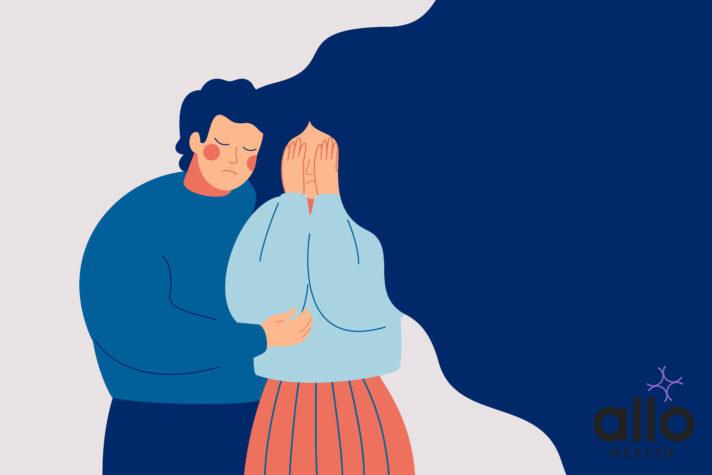Understanding and Addressing Low Sex Drive in Your Girlfriend

Allo Health is dedicated to personalized well-being, offering support and trusted information tailored to individual health goals. The platform emphasizes human-generated content, led by a distinguished medical team of experts, including physicians and sexual health specialists. Their commitment to credibility involves rigorous fact-checking, authoritative research, and continuous updates to ensure accurate, up-to-date information. Allo Health's unique approach goes beyond conventional platforms, providing expert-led insights and a continuous commitment to excellence, with user feedback playing a crucial role in shaping the platform's authoritative voice.

Dr.Sushma.V completed MBBS degree from BGS GIMS,bangalore
Why This Was Upated?
Our experts continually monitor the health and wellness space, and we update our articles when new information became available.
Updated on 02 February, 2024
- Article was updated as part of our commitment to diversity, equity, and inclusion.

"The following blog article may discuss medical treatments and interventions. However, it is important to note that the information provided is for general educational purposes only and should not be considered as a substitute for professional medical advice, diagnosis, or treatment. Always seek the guidance of a qualified healthcare professional for personalized medical advice.
Book consultation
Medical treatments are complex and should be tailored to individual circumstances. The information presented in this blog may not be applicable to everyone, as each person's medical condition, history, and needs are unique. Only a qualified healthcare professional can evaluate your specific medical situation, consider relevant factors, and provide appropriate recommendations for diagnosis, treatment options, and monitoring.
It is crucial to note that self-diagnosis, self-medication, or relying solely on the information provided in this blog for treatment decisions can have serious health consequences. "
Sexual desire is an essential part of any romantic relationship, but when one partner has a low sex drive, it can become a challenging issue to deal with. Many men struggle to understand why their girlfriends have a lack of sex drive, and worse still, they can’t seem to find ways to help boost their partner’s libido. However, with patience and understanding, it is possible to address the problem and maintain a healthy and satisfying relationship. In this article, we explore the various reasons behind low sex drive in women and offer practical tips on how to deal with them.
Understanding the Causes of Low Sex Drives in Women
First and foremost, it is essential to understand that women have different sexual desires and responses than men. While men’s libido is primarily driven by physical stimulation, women’s sexual desire is more complex and can be influenced by various factors such as hormonal changes, stress, anxiety and emotional connections.
Factors Contributing to Low Sex Drive in Women:
- Complex Nature of Female Libido:
- Women’s sexual desires and responses differ from men’s.
- Female libido is influenced by physical, emotional and psychological factors.
- Hormonal Changes:
- Hormonal imbalances during menopause, pregnancy or childbirth can reduce sex drive.
- Stress and Anxiety:
- High-stress levels or relationship-related anxiety can decrease libido.
- Medications:
- Certain medications, like antidepressants, may negatively affect sexual desire and function.
- Chronic health conditions:
- Diseases such as diabetes, heart disease, high blood pressure and cancer can impact a woman’s sexual function and desire.
Treatment Options for Low Sex Drive in Women:
- Lifestyle Changes:
- Incorporating regular exercise can improve libido.
- Utilizing stress reduction techniques, such as mindfulness and relaxation, can help.
- Medical Interventions:
- Hormone therapy may be an option for addressing hormonal imbalances.
- Medications can be prescribed to address specific underlying causes.
- Consulting Healthcare Provider:
- Women must speak with their sex therapist to identify the root cause of low sex drive.
- sex therapist can help develop personalized treatment plans tailored to individual needs.

Tips for Starting a Conversation with Your Girlfriend about Low Sex Drive
Certainly, here are some tips for starting a conversation with your girlfriend about low sex drive:
1. Choose the Right Time and Place:
- Find a private and comfortable setting where you both can talk openly without distractions or interruptions.
2. Express Your Love and Concern:
- Begin the conversation by expressing your love and care for her.
- Let her know that her happiness and well-being are important to you.
3. Be Non-Judgmental:
- Avoid making judgments or criticisms about her low sex drive.
- Create a safe space for her to share her feelings without fear of negativity.
4. Ask Open-Ended Questions:
- Encourage her to share her thoughts and feelings by asking open-ended questions.
- For example, ask what might be causing her low sex drive and how you can support her.
5. Be a Good Listener:
- Listen attentively to what she has to say without interrupting.
- Show empathy and understanding for her perspective.
6. Acknowledge the Complexity of Low Sex Drive:
- Recognize that low sex drive can have various causes, including stress, hormonal changes, medications and relationship issues.
7. Offer Reassurance:
- Reassure her that you are there to support her and that your goal is to understand and find solutions together.
8. Discuss the Importance of Seeking Help:
- If necessary, discuss the possibility of seeking professional help, such as therapy or medical treatment.
- Emphasize that seeking help is a positive step toward addressing the issue.
9. Avoid Pressure and Expectations:
- Avoid pressuring her into immediate solutions or setting expectations.
- Focus on understanding and finding ways to navigate the issue together.
10. Be Patient and Understanding:
- Understand that addressing low sex drive may take time and there may be ups and downs along the way.
- Be patient and continue to show your support and love.
Remember that open communication and empathy are key to addressing sensitive topics like low sex drive in a relationship. By approaching the conversation with care and understanding, you can work together to find solutions and strengthen your bond.
Finding Common Ground: Compromising on Sexual Frequency
Compromising on Sexual Frequency:
- Discuss Expectations:
- Have an open conversation about your expectations regarding sexual frequency.
- Find a Middle Ground:
- Aim to find a compromise that works for both partners.
- For example, if one partner wants sex once a month and the other prefers once a week, consider settling on twice a month.
- Respect Boundaries:
- Respect each other’s boundaries and never pressure your partner into sex when they’re not in the mood.
- Emphasize Intimacy:
- Focus on building emotional and physical intimacy beyond just sexual experiences.
- Activities like cuddling, holding hands and spending quality time together can strengthen your connection.
Understanding Libido Factors:
- Identify Underlying Causes:
- Recognize that stress, anxiety, hormonal imbalances and other factors can influence libido.
- Address these underlying issues to help improve sexual intimacy.
- Seek Professional Help:
- If necessary, consider seeking professional assistance or therapy to address deeper-rooted libido issues.
Spicing Up Your Sex Life:
- Explore New Experiences:
- Experiment with new sexual experiences, positions or activities to add excitement and variety.
- Incorporate Novelty:
- Use sex toys or engage in role-playing to spice up your sexual encounters.
Open and Honest Communication:
- Prioritize Communication:
- Continue to have open and honest discussions with your partner about your needs and desires.
- Avoid bottling up feelings of lack of satisfaction, as it can lead to relationship issues.
Balancing Emotional and Physical Well-Being:
- Maintain Balance:
- Strive to strike a balance that satisfies both partners’ emotional and physical needs.
- Prioritize Well-Being:
- Remember that a healthy relationship prioritizes the emotional and physical well-being of both individuals.
By following these guidelines and working together, couples can navigate differences in libido and maintain a satisfying and fulfilling relationship.
Navigating Libido: Exploring the Influence of Hormones on Sexual Well-being
Hormones play a significant role in regulating sexual desire (libido) in both men and women. In women, several hormonal changes or imbalances can contribute to a decrease in sex drive. Here are some key hormones and their roles in influencing female sexual desire:
- Estrogen: Estrogen is a primary female sex hormone responsible for various aspects of reproductive health. It plays a crucial role in maintaining vaginal lubrication and promoting sexual response. A drop in estrogen levels, which can occur during menopause or due to hormonal birth control, can lead to vaginal dryness and discomfort during sex, potentially reducing libido.
- Progesterone: Progesterone is another hormone involved in the menstrual cycle and pregnancy. Some women may experience decreased libido during specific phases of their menstrual cycle when progesterone levels are high, such as during the luteal phase. This decrease in libido may be related to changes in mood or physical discomfort.
- Testosterone: Although often associated with men, women also produce small amounts of testosterone. Testosterone plays a role in sexual desire in both genders. A decrease in testosterone levels, which can occur due to aging or medical conditions like polycystic ovary syndrome (PCOS), can lead to a reduced sex drive in women.
- Prolactin: Prolactin is a hormone primarily known for its role in breastfeeding. Elevated levels of prolactin, often caused by conditions like hyperprolactinemia or certain medications, can interfere with normal menstrual cycles and reduce sexual desire.
- Thyroid Hormones: Thyroid hormones (thyroxine and triiodothyronine) influence metabolism and energy levels. An underactive thyroid (hypothyroidism) can lead to fatigue and low energy, which may indirectly affect libido.
- Stress Hormones: Chronic stress can lead to elevated levels of stress hormones like cortisol. High levels of stress hormones can disrupt the normal hormonal balance, including sex hormones, and result in a decreased sex drive.
It’s important to note that hormone-related changes in libido can vary widely among individuals. Not all women will experience a decrease in sex drive due to hormonal factors and other non-hormonal factors like stress, relationship issues and emotional well-being can also play a significant role.
Understanding the Impact of Stress and Anxiety on Libido and Effective Management Strategies
Stress and anxiety can significantly reduce a woman’s libido and managing them is crucial. Here’s a more concise breakdown:
Impact of Stress and Anxiety on Libido:
- High cortisol levels from stress can disrupt sex hormone production and lower libido.
Managing Stress and Anxiety:
- Encourage relaxation techniques like yoga, meditation or deep breathing exercises.
- Prioritize self-care through proper sleep, a balanced diet and regular exercise.
- Offer emotional support and help with reducing her workload.
Addressing Psychological Factors:
- Negative thoughts, low self-esteem, or relationship issues can affect sexual desire.
- Consider therapy or counseling, either individually or as a couple.
Medication Considerations:
- Some medications, like antidepressants or birth control pills, can have libido-reducing side effects.
- Discuss potential medication adjustments with a healthcare provider if needed.
Taking steps to manage stress, address psychological factors and consider medication-related issues can help improve libido and overall well-being.
Lifestyle Changes that Can Boost Your Girlfriend’s Libido
Certainly, here are some lifestyle changes that can boost your girlfriend’s libido, summarized:
Encourage Healthy Lifestyle Habits:
- Suggest regular exercise, a balanced diet and getting enough sleep to improve overall well-being and sex drive.
Support Work-Life Balance:
- Promote a healthy work-life balance to reduce stress and anxiety, which can enhance emotional connection and libido.
Explore New Activities and Fantasies:
- Encourage trying new activities, exploring sexual fantasies or introducing novelty to spark interest in sex.
Affirmation and Positivity:
- Regularly affirm her beauty and attractiveness and express interest in her life.
- Positive reinforcement can boost self-esteem and contribute to improved libido.
Limit Alcohol Consumption:
- Excessive alcohol consumption can lead to decreased sexual desire and performance.
- Encourage moderation in alcohol intake and alternative relaxation methods.
Effective Communication:
- Create an open environment for discussing desires and preferences.
- Being receptive to each other’s needs and trying new things can strengthen trust and intimacy in the relationship.
By supporting these lifestyle changes and fostering open communication, you can help enhance your girlfriend’s libido and contribute to a more fulfilling and satisfying sexual relationship.
Exploring Alternative Forms of Intimacy: Non-Sexual Ways to Connect with Your Partner
Finally, it’s essential to recognize that sex is not the only way to connect with your partner physically and emotionally. Exploring non-sexual ways to connect with your girlfriend, such as cuddling, holding hands, having long conversations and showing physical affection can promote feelings of sexual intimacy and bonding. It can also take pressure off sex life and increase appreciation and understanding of one another, leading to a deeper and more meaningful connection.
Additionally, engaging in shared activities and hobbies can also foster intimacy and connection in a relationship. Whether it’s cooking together, going for a hike or taking a dance class, participating in activities that you both enjoy can create shared experiences and memories that strengthen your bond. It’s important to prioritize spending quality time together and finding ways to connect that goes beyond sexual intimacy.
The Importance of Patience and Understanding in Addressing Low Sex Drive
Patience is crucial when dealing with low sex drive. Finding a solution may take time, and there may be setbacks. Show patience and persistence in addressing the issue and avoid putting pressure or being critical, as it is counterproductive. Understand that your girlfriend’s low sex drive is not a reflection of her attraction or love towards you. Rather, it is a complex interplay of various factors that need to be addressed. By remaining calm, supportive and tolerant, you will build trust and strengthen the emotional connection between you.
It is important to communicate openly and honestly with your partner about low sex drive. Discussing the issue can help both of you understand each other’s needs and feelings. It can also help identify any underlying issues that may be contributing to the low sex drive, such as stress, anxiety or medical conditions. By working together, you can find a solution that works for both of you.
Shedding Light on Hypoactive Sexual Desire Disorder (HSDD)
Hypoactive Sexual Desire Disorder (HSDD) is a medical term used to describe a persistent and distressing lack of sexual desire or interest in sexual activity. It is characterized by a noticeable and ongoing absence of sexual fantasies, thoughts, or desires that significantly affect a person’s quality of life and cause personal distress.
- Persistent Lack of Desire: Individuals with HSDD experience a persistent lack of interest or desire for sexual activity, even when they are in situations that typically trigger sexual desire.
- Personal Distress: The absence of sexual desire must cause personal distress, leading to dissatisfaction with one’s sex life or intimate relationships.
- Duration: The symptoms of HSDD must be present for an extended period, usually at least six months.
- Not Attributed to Other Factors: The lack of desire should not be a result of other factors such as medical conditions, medication side effects, substance abuse, relationship problems or external stressors.
It’s important to note that HSDD can affect individuals of any gender, although it is often discussed in the context of women. The causes of HSDD can be complex and may include psychological, emotional, physical or hormonal factors. It can be influenced by relationship dynamics, previous sexual experiences, cultural or societal factors, and medical conditions.
Treatment options for HSDD may include psychotherapy (such as cognitive-behavioral therapy or sex therapy), couples counseling, lifestyle changes, addressing underlying medical conditions and in some cases, medications that target sexual desire. It’s crucial for individuals experiencing HSDD to seek help from a healthcare provider or a qualified therapist to diagnose and address the condition effectively, as it can have a significant impact on one’s well-being and relationships.
Seeking Professional Help: When to Consider Therapy or Counseling for Low Sex Drive
If your girlfriend persists in having a low sex drive despite lifestyle changes, it may be time to consider seeking professional help. Consulting with a therapist or counselor can help you both understand the underlying causes of her low sex drive and provide a structured plan of action through counseling or psychotherapy. These types of treatment typically involve exploring the complex interplay of issues like self-esteem, body issues, sexual trauma or negative sexual messages and have been shown to yield positive outcomes.
It is important to note that seeking professional help for low sex drive does not mean that there is something inherently wrong with your relationship or your partner. Low sex drive is a common issue that affects many individuals and can be caused by a variety of factors. By seeking help, you are taking a proactive step toward improving your sexual health and overall well-being.
Final Thoughts: Maintaining a Healthy Relationship Despite Differences in Libido
Maintaining a healthy relationship despite differences in libido is possible with understanding and communication. Address the root causes of low sex drive, encourage open conversations and be empathetic. Remember, emotional and physical connection matters as much as sex frequency. Seek medical advice if needed, as factors like stress or hormonal imbalances can affect libido. Explore non-sexual intimacy to strengthen your emotional bond. A healthy relationship encompasses more than just physical intimacy; nurturing emotional connections is equally vital. With patience and care, you can navigate this challenge and maintain a loving relationship.
Most Asked Questions
-
What are the common causes of low sex drive in women?
Common causes include hormonal changes, stress, anxiety, relationship issues, medications, and chronic health conditions.
-
How can I start a conversation with my partner about their low sex drive?
Choose a comfortable and private setting, express your love and concern, be non-judgmental, ask open-ended questions, listen attentively, and offer reassurance and support.
-
What role do hormones play in decreasing libido in women?
Hormones like estrogen, progesterone, testosterone, and others can influence sexual desire in women. Imbalances or changes in these hormones can contribute to decreased libido.
-
How can I boost my partner's libido through lifestyle changes?
Encourage healthy habits like regular exercise, a balanced diet, stress management, and exploring new activities. Prioritize emotional intimacy and open communication.
-
When should I consider seeking professional help for low sex drive in my partner?
If lifestyle changes do not improve the situation, or if the low sex drive persists and causes distress, it may be time to consult a therapist or healthcare provider for guidance and potential treatment options.







































